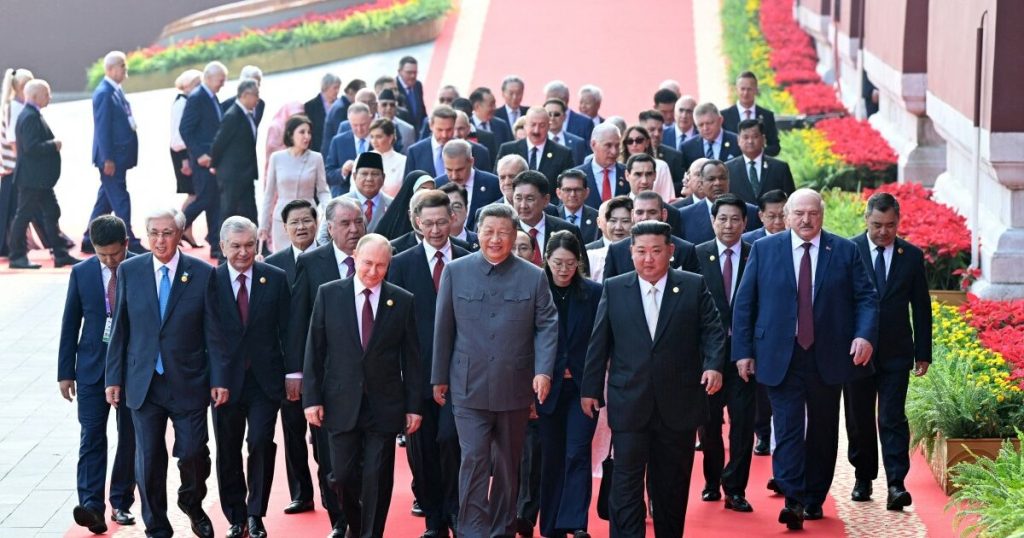The exchange between Xi Jinping and Vladimir Putin, captured by state media microphones during Beijing’s military parade, offers a glimpse into the leaders’ perspectives on longevity and the potential of biotechnology. Their conversation, punctuated by a Tang dynasty poem referencing increased lifespans, touched upon organ transplants and the possibility of significantly extending human life, even reaching immortality. Xi’s remark about the potential for humans to live to 150 years old in this century underscores a fascination with the evolving capabilities of medical science and its implications for the future of human existence. This seemingly casual exchange carries significant weight considering the geopolitical context and the leaders’ own positions of power.
The backdrop of the military parade itself, with Xi, Putin, and Kim Jong Un standing shoulder-to-shoulder, presents a powerful image of unity and a potential challenge to the established world order. The parade, a display of China’s military might, served as a platform for these leaders to project their collective strength and shared vision. The timing of their conversation, amidst this demonstration of power, adds another layer to the discussion on longevity. It subtly raises questions about the long-term implications of their leadership and the potential for their influence to extend far into the future, further solidified by their shared interest in life extension technologies.
Putin’s subsequent confirmation of the exchange during a press briefing lent further credence to the captured conversation. His elaboration on the role of modern medical advancements, including organ transplantation, in extending active lifespans, aligns with the remarks picked up by the microphones. This public acknowledgment reinforces the seriousness with which these leaders consider the prospects of significantly prolonged life, moving beyond mere speculation and into the realm of tangible possibilities powered by scientific progress. It also hints at a shared forward-thinking approach, where advancements in biotechnology are not just observed but actively considered in the context of their own lives and leadership trajectories.
The conversation between Xi and Putin on life extension takes on added significance when viewed in light of their respective political trajectories. Both leaders, currently in their seventies, have demonstrated a firm grip on power with no immediate indications of stepping down. Xi’s abolition of term limits in 2018, paving the way for his third term as president in 2023, breaks with the precedent set by his predecessors. This move, coupled with the conversation on extended lifespans, suggests a potential desire for prolonged leadership and a belief in their continued capacity to govern effectively, even into advanced age. The discussion about extending life through biotechnology could be interpreted as reflecting a desire to remain at the helm, leveraging advancements in medical science to potentially prolong their time in power.
The leaders’ interest in longevity and life extension technologies raises important questions about the intersection of politics, science, and the future of leadership. While the pursuit of longer, healthier lives is a universal human aspiration, the context of this conversation, initiated by powerful leaders with long-term visions for their respective nations, adds a layer of complexity. The implications of significantly extended lifespans for political leadership are vast and largely unexplored. Could advancements in biotechnology lead to a new era of gerontocracy, where leaders remain in power for significantly longer periods? How might this impact political succession, the dynamism of political systems, and the ability of societies to adapt to changing times? These are crucial questions that warrant careful consideration as scientific progress continues to push the boundaries of human lifespan.
The brief exchange between Xi and Putin, seemingly a casual conversation on the sidelines of a grand military display, offers a profound glimpse into the future aspirations of two of the world’s most powerful leaders. Their interest in longevity and the potential of biotechnology to dramatically extend human life spans raises important questions about the future of leadership, the intersection of science and politics, and the potential impact of these advancements on the global stage. As medical science continues to unlock the secrets of aging and extend human lifespans, the conversation between Xi and Putin serves as a reminder of the profound implications of these advancements for the future of humanity and the shape of global power dynamics.


